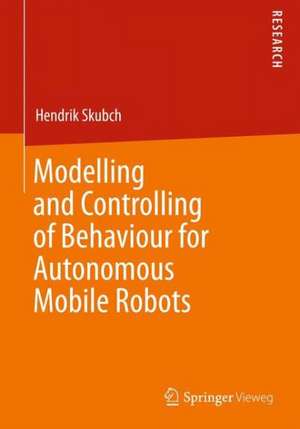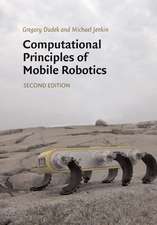Modelling and Controlling of Behaviour for Autonomous Mobile Robots
Autor Hendrik Skubchen Limba Engleză Paperback – 26 noi 2012
Preț: 329.58 lei
Preț vechi: 411.98 lei
-20% Nou
Puncte Express: 494
Preț estimativ în valută:
63.08€ • 68.55$ • 53.03£
63.08€ • 68.55$ • 53.03£
Carte tipărită la comandă
Livrare economică 21 aprilie-05 mai
Preluare comenzi: 021 569.72.76
Specificații
ISBN-13: 9783658008109
ISBN-10: 3658008105
Pagini: 280
Ilustrații: XVII, 259 p. 46 illus., 16 illus. in color.
Dimensiuni: 148 x 210 x 15 mm
Greutate: 0.34 kg
Ediția:2013
Editura: Springer Fachmedien Wiesbaden
Colecția Springer Vieweg
Locul publicării:Wiesbaden, Germany
ISBN-10: 3658008105
Pagini: 280
Ilustrații: XVII, 259 p. 46 illus., 16 illus. in color.
Dimensiuni: 148 x 210 x 15 mm
Greutate: 0.34 kg
Ediția:2013
Editura: Springer Fachmedien Wiesbaden
Colecția Springer Vieweg
Locul publicării:Wiesbaden, Germany
Public țintă
ResearchCuprins
Task Allocation.- Distributed Constraint Solving.- Multi-Robot Systems.- Cooperation.- Plan Execution.- Behaviour Modelling.
Notă biografică
Dr. Hendrik Skubch completed his doctoral degree under the supervision of Prof. Dr. Kurt Geihs at the Distributed Systems Group at the University of Kassel.
Textul de pe ultima copertă
As research progresses, it enables multi-robot systems to be used in more and more complex and dynamic scenarios. Hence, the question arises how different modelling and reasoning paradigms can be utilised to describe the intended behaviour of a team and execute it in a robust and adaptive manner. Hendrik Skubch presents a solution, ALICA (A Language for Interactive Cooperative Agents) which combines modelling techniques drawn from different paradigms in an integrative fashion. Hierarchies of finite state machines are used to structure the behaviour of the team such that temporal and causal relationships can be expressed. Utility functions weigh different options against each other and assign agents to different tasks. Finally, non-linear constraint satisfaction and optimisation problems are integrated, allowing for complex cooperative behaviour to be specified in a concise, theoretically well-founded manner.
Contents
· Task Allocation
· Distributed Constraint Solving
· Multi-Robot Systems
· Cooperation
· Plan Execution
· Behaviour Modelling
Target Groups
Researchers and students in the fields of computer science, robotics, and artificial intelligence; artificial intelligence programmer.
Author
Dr. Hendrik Skubch completed his doctoral degree under the supervision of Prof. Dr. Kurt Geihs at the Distributed Systems Group at the University of Kassel.
Contents
· Task Allocation
· Distributed Constraint Solving
· Multi-Robot Systems
· Cooperation
· Plan Execution
· Behaviour Modelling
Target Groups
Researchers and students in the fields of computer science, robotics, and artificial intelligence; artificial intelligence programmer.
Author
Dr. Hendrik Skubch completed his doctoral degree under the supervision of Prof. Dr. Kurt Geihs at the Distributed Systems Group at the University of Kassel.
Caracteristici
Publication in the field of technical sciences Includes supplementary material: sn.pub/extras









